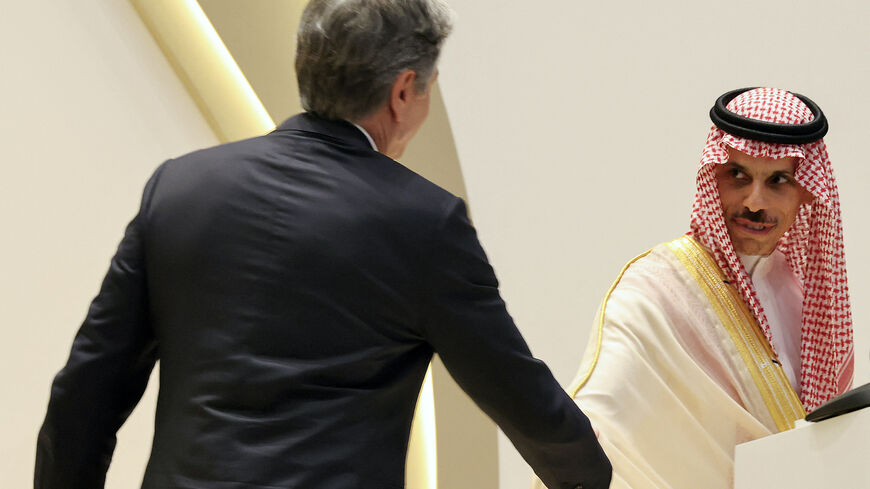RIYADH — Saudi Arabia expects cooperation with its “important partner” China to keep growing, the top Saudi diplomat told Al-Monitor as Secretary of State Antony Blinken wrapped up a three-day visit to the oil-rich kingdom.
“I think that partnership has given us and China significant benefits and that cooperation is likely to grow,” Saudi Foreign Minister Prince Faisal bin Farhan said, pointing to "a lot of interaction and intersection with China."
"But we still have a robust security partnership with the US," he added. "That security partnership is refreshed on an almost daily basis."
Prince Faisal spoke at a press conference alongside Blinken, who on Thursday concluded a trip to Saudi Arabia aimed at mending ties after years of strain over the supply of oil, human rights and the kingdom’s growing relations with US rivals, including China.
Blinken’s visit came the same week that Iran reopened its embassy in Saudi Arabia as part of a deal that Beijing brokered in March to restore diplomatic relations between the two longtime foes.
Saudi Arabia is a longstanding partner of the United States but it is rapidly building ties with China, its largest trading partner and biggest purchaser of Saudi oil.
The Persian Gulf is increasingly looking eastward for economic alternatives. Chinese bilateral trade with Iran and the GCC states totaled $248 billion in 2021 — four times those countries’ trade with the United States. China has also made inroads into the region’s armed drone market.
Asked whether American retrenchment had created a vacuum for China to fill, Prince Faisal echoed a phrase often used in Beijing's criticisms of what it regards as divisive US foreign policy: "I don’t subscribe to this zero-sum game," he said.
As recently as March, Chinese Foreign Minister Qin Gang called for the United States to “abandon the zero-sum Cold War mentality.” The next month, the Chinese foreign ministry accused the US of maintaining a “zero-sum mentality in pursuit of selfish interests."
The Biden administration has previously called China the biggest geopolitical challenge faced by the United States in the 21st century. In defending his much-criticized visit to the Saudi city of Jeddah last July, President Joe Biden said engaging Saudi leaders would put the United States “in the best possible position to outcompete China.”
But on Thursday, Blinken insisted the administration isn’t asking Middle East countries to choose between the United States and China.
“We’re simply trying to demonstrate the benefits of our partnership and the affirmative agenda that we bring,” he told Al-Monitor in Thursday's press conference.
Saudi Arabia’s drift toward China comes as Crown Prince Mohammed bin Salman’s foreign policy begins to resemble that of a traditional Saudi leader, said Bruce Reidel, a senior fellow at the Brookings Institution.
“This is a much more diplomacy-oriented Saudi foreign policy than what we saw in the first years of the MBS era,” Reidel said, pointing to the detente with Iran and ceasefire in Yemen.
On the eve of Blinken’s trip to Jeddah, MBS hosted longtime US foe Nicolas Maduro, the president of Venezuela, at the Al-Salam Palace in the coastal Saudi city. The same day he met with Blinken, the crown prince took a call from Russian President Vladimir Putin.
Saudi Arabia also broke with the United States last month when it chose to invite Syria’s long-shunned president, Bashar al-Assad, to Jeddah to attend the Arab League summit.
Asked about the region’s embrace of Assad, Blinken downplayed differences with Washington’s Arab partners: “The goals are very much the same, I think moving forward ... we’ll see if we can achieve some progress.”







